- Ridgewater College is a comprehensive community and technical college offering education designed for transfer to a university as well as technical programs intended for direct entry into the workforce. Located in central Minnesota, Ridgewater has campuses in Hutchinson and Willmar. We are one of outstate Minnesota's largest public colleges, and are accredited by the Higher Learning Commission of the North Central Association of Colleges and Schools.Ridgewater College provides quality learning opportunities for students in accessible, affordable, and supportive settings.
School Highlights
Ridgewater College serves 3,525 students (49% of students are full-time).
The college's student:teacher ratio of 15:1 is lower than the state community college average of 22:1.
Minority enrollment is 23% of the student body (majority Hispanic), which is less than the state average of 42%.
Quick Stats (2025)
- Enrollment: 3,525 students
- In-state tuition: $5,400
- Out-state tuition: $5,400
- Student:teacher ratio: 15:1
- Minority enrollment: 23%
- Source: Integrated Postsecondary Education Data System (IPEDS)
School Overview
The teacher population of 230 teachers has stayed relatively flat over five years.
Ridgewater College
(MN) Community College Avg.
Carnegie Classification
Associate's Colleges: High Career & Technical-Mixed Traditional/Nontraditional
Associate's Colleges: Mixed Transfer/Career & Technical-Mixed Traditional/Nontraditional
Institution Level
At least 2 but less than 4 years
At least 2 but less than 4 years
Institution Control
Public
Public
Total Faculty
230 staff
153 staff
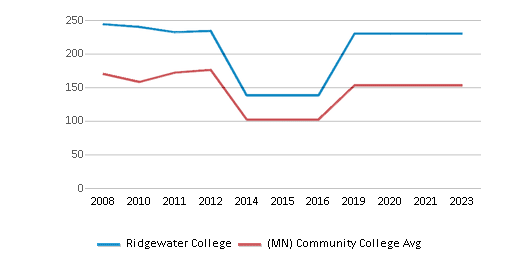
School Calendar
Student Body
The student population of Ridgewater College has grown by 8% over five years.
The student:teacher ratio of 15:1 has increased from 14:1 over five years.
The Ridgewater College diversity score of 0.39 is less than the state average of 0.63. The school's diversity has grown by 17% over five years.
Total Enrollment
3,525 students
2,555 students
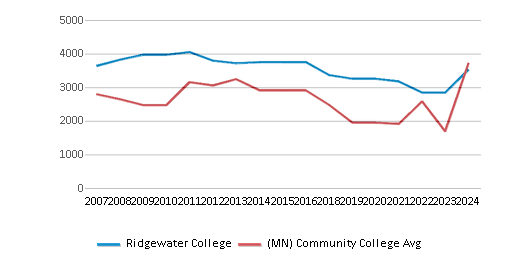
Student : Teacher Ratio
15:1
22:1
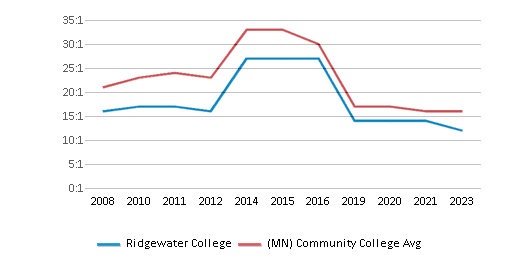
# Full-Time Students
1,717 students
915 students
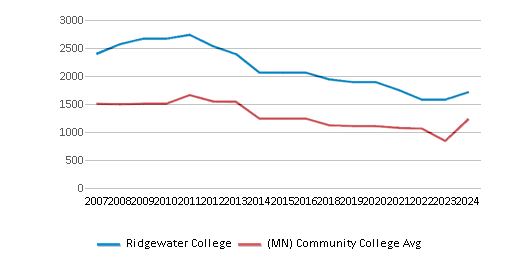
# Part-Time Students
1,808 students
1,808 students
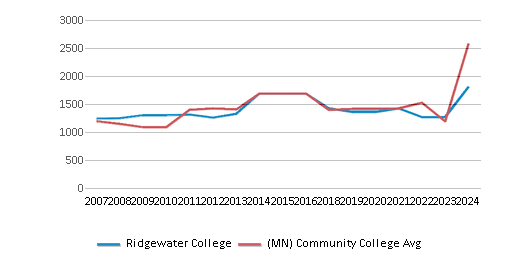
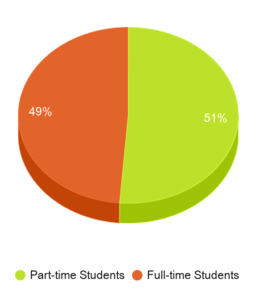
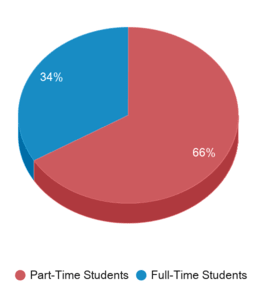
# Enrollment Undergraduate
352 students
372 students
# Full-Time Undergraduate Students
1,717 students
842 students
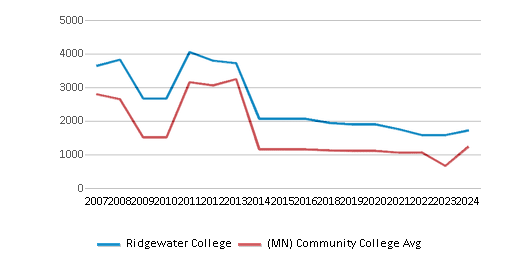
# Full-Time Graduate Students
n/a
38 students
# Part-Time Undergraduate Students
1,808 students
1,771 students
# Part-Time Graduate Students
n/a
12 students
Total Dormitory Capacity
n/a
116 students
% American Indian/Alaskan
n/a
1%
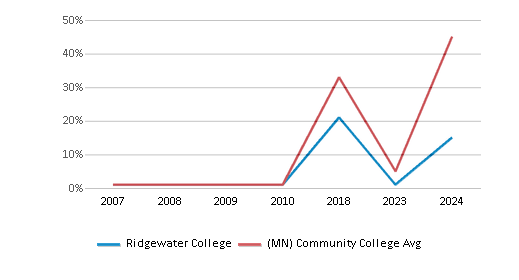
% Asian
2%
6%
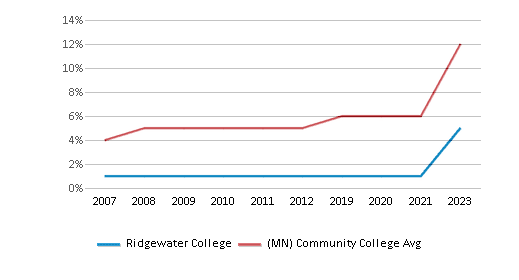
% Hispanic
11%
8%
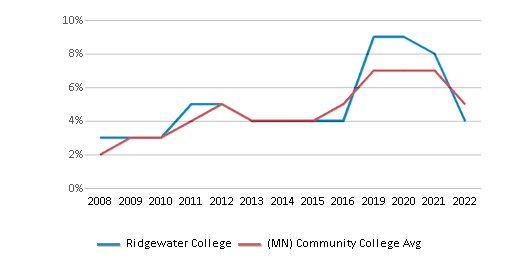
% Black
4%
15%
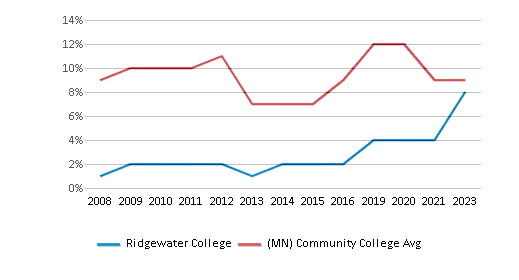
% White
77%
58%
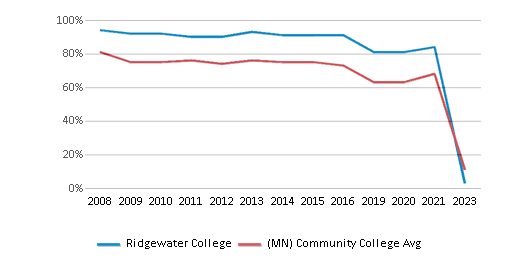
% Hawaiian
n/a
1%
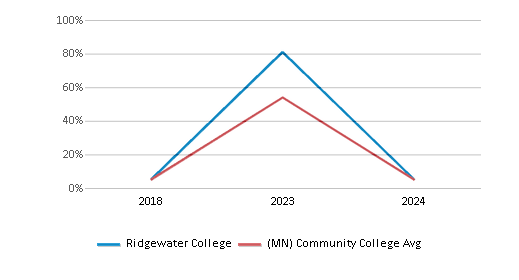
% Two or more races
2%
4%
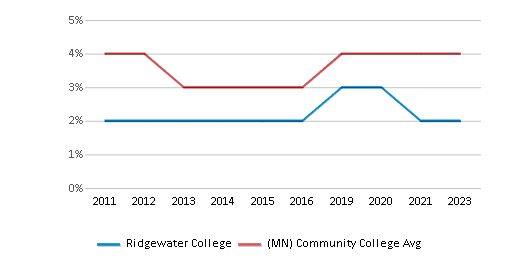
% Non Resident races
n/a
1%
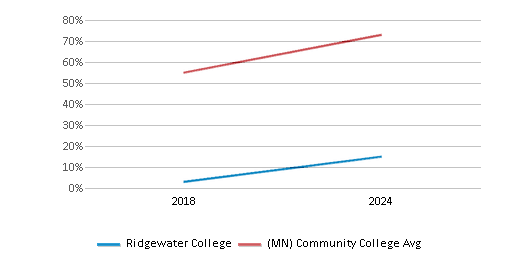
% Unknown races
3%
6%
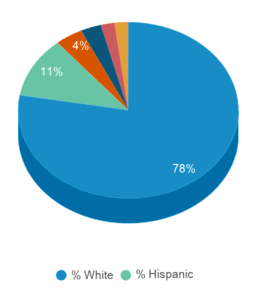
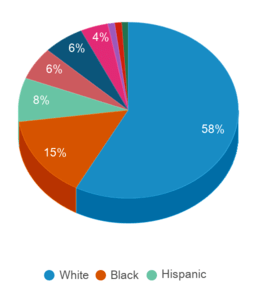
Diversity Score
0.39
0.63
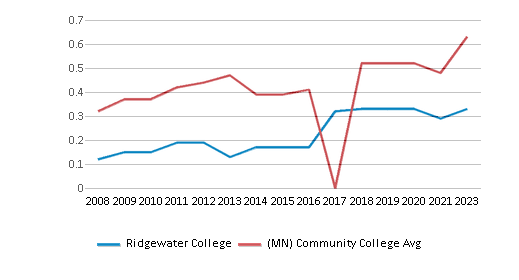
College Completion Rate (Students who graduate in less than 4 years)
0.45%
0.3421%
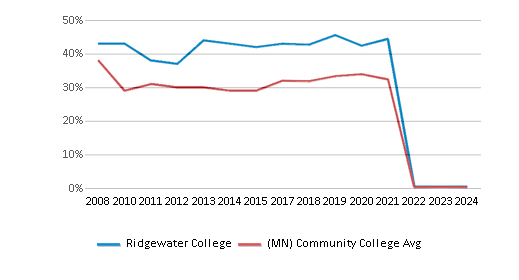
College Completion Rate (Students who graduate in 4 years or more than 4 years)
n/a
0.5652%
Average Graduate Earnings (10 Years)
$35,300
$36,900
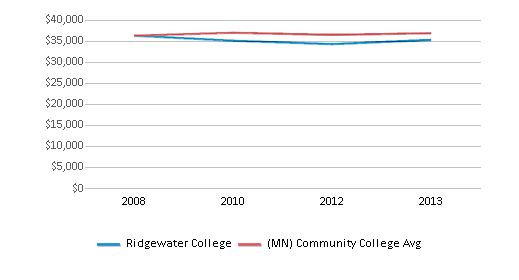
Tuition and Acceptance Rate
The public in-state tuition of $5,400 is less than the state average of $5,489. The in-state tuition has declined by 9% over four years.
The public out-state tuition of $5,400 is less than the state average of $6,145. The out-state tuition has declined by 9% over four years.
In-State Tuition Fees
$5,400
$5,489
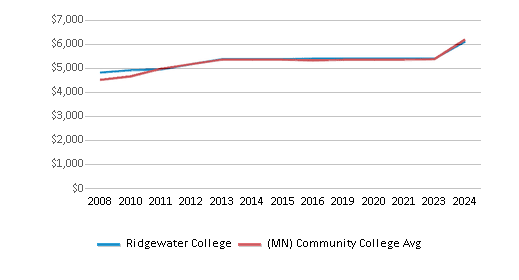
Out-State Tuition Fees
$5,400
$6,145
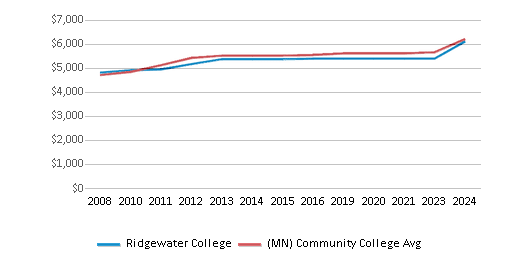
% Students Receiving Some Financial Aid
74%
89%
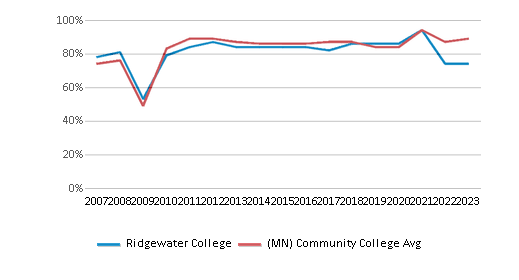
Median Debt for Graduates
$12,000
$12,264
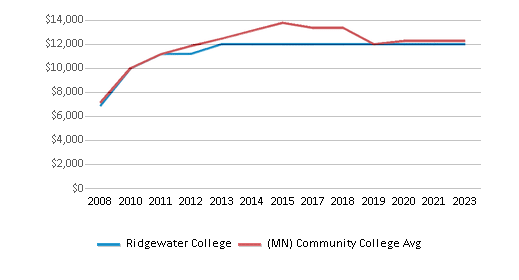
Median Debt for Dropouts
$5,931
$6,747
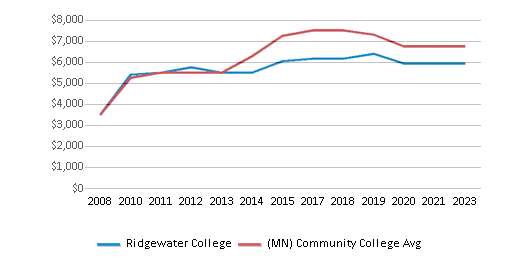
Acceptance Rate
n/a
94%
SAT Reading
n/a
625
SAT Math
n/a
600
SAT Writing
n/a
565
ACT Composite
n/a
24
ACT English
n/a
24
ACT Math
n/a
23
ACT Writing
n/a
8
Source: 2024 (or latest year available) Integrated Postsecondary Education Data System (IPEDS) , School Administrators
School Notes
- Ridgewater College is a community and technical college that offers more than 100 educational programs in Transfer Education, transfer options, and technical education. Ridgewater College serves more than 5500 students on its campuses in the growing communities of Willmar and Hutchinson, Minnesota. Ridgewater College also offers some programs that are unique in the state of Minnesota and nationally. Small class sizes, up-to-date technology, and access to many student activities and organizations (including intercollegiate sports, choir, theater, and Student Senate) give students the opportunity to enjoy a positive college experience. Ridgewater College is proud of its scholarship foundation, and excellent graduation and job placement rates. Ridgewater College is recognized as an educational leader that exemplifies innovation and excellence within a student-centered learning environment, and is dedicated to providing an accessible, affordable, and supportive setting for all students. At Ridgewater College, students are encouraged to participate in a wide variety of activities including: arts, athletics, student government, theater, music, clubs, and organizations (offerings differ by campus). Ridgewater College is accredited by the Higher Learning Commission of the North Central Association of Colleges and Schools.
Frequently Asked Questions
How much does Ridgewater College cost?
Ridgewater College's tuition is approximately $5,400 for In-State students and $5,400 for Out-State students.
Recent Articles

Obtaining Your Bachelor's Degree at a Community College
Explore the evolving landscape of community colleges offering bachelor's degrees, addressing affordability, accessibility, and workforce needs.

A to Z of Community College Certificates and Courses
From business and healthcare to technology and skilled trades, the article showcases the breadth of options available to students seeking to enhance their knowledge, develop new skills, or pursue career advancement.

What is a Community College?
This comprehensive guide explains what a community college is, its history, and its role in higher education. It covers the types of programs offered, differences from four-year colleges, benefits of attending, and important considerations for prospective students, providing valuable insights for those exploring educational options.
























